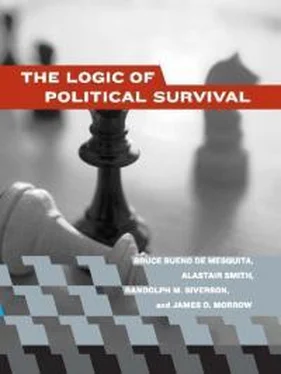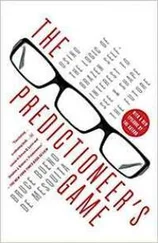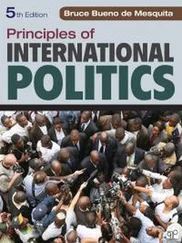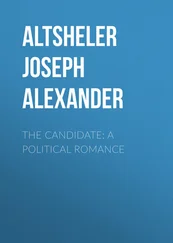Coordination and Distribution Issues
Some earlier theories of institutional change during crises emphasize the coordination issues that can help promote new political arrangements (Linz and Stepan 1978; Haggard and Kaufman 1995; North, Summerhill, and Weingast 2000). These theories draw our attention to important but inherently rare events. The theory we suggest complements the focus of others on coordination during crises by addressing the problems associated with the distribution of valuable resources during ordinary times. Most politics and much political change do not take place during a crisis, but rather reflect slower evolutionary change. We try to fill in the gap by looking at distribution issues as well as coordination issues in politics.
Leaders in any political system face the more-or-less continuous threat that they will lose the support of key backers. Democracies somewhat ameliorate this threat by providing for fixed terms. Of course, they also generally provide mechanisms to shorten the fixed term. That is exactly the purpose of votes of no confidence (Huber 1996), the right to call early elections (Smith 1996, 2004; Gallego 1999, 2001), and impeachment. If leaders in any political system lose the support of key backers, the incumbent—and perhaps the regime—is turned out of office. In a democracy, the incumbent lives to run again another day. In many authoritarian systems defeated incumbents are lucky if they can retreat into exile. Sometimes their loss of office is accompanied by the loss of their life (Werner 1996; Goemans 2000). 3Even the pope must maintain support among core constituents (usually a set of bishops) and can be forced from office if he fails to do so. Pope Celestine V (1294) “voluntarily” resigned his office, an action unprecedented in Church history. It is widely believed that Celestine was forced to leave office by Boniface VIII, elected as his successor eleven days after Celestine’s resignation. Indeed, after Celestine V resigned, Boniface sentenced him to death and had him imprisoned in Castel Fumone, where he died in 1296 (Schimmelpfennig 1992, 195). Boniface’s apparent motive was to prevent a resurgence of support for his rival.
Make no mistake about it, no leader rules alone. Even the most oppressive dictators cannot survive the loss of support among their core constituents. Hitler was well aware of this fact. Members of the German army, for instance, plotted against Hitler in 1938 and attempted to assassinate him in 1942 and 1944. Following the 1944 attempt, Hitler ordered the deaths of thousands of military and intelligence officers, including Erwin Rommel, one of his best and most popular generals. Earlier, Hitler suspected Ernst Röhm of being a rival for power and had him murdered.
Public Goods and Private Goods
Regardless of the structure of the political system, leaders have a relatively small set of instruments available to promote their political survival. They can promulgate general public policies that satisfy the desires of their supporters and perhaps the desires of others among the citizens of the state, and they can dole out private benefits to purchase the continued support of their critical backers. We have in mind that public policies, or at least identifiable components of them, approximate the characteristics of classic public goods, being nonexcludable and nonrival (Olson 1965; Bergstrom and Goodman 1973; Cornes and Sandler 2001). 4Private goods, of course, are excludable and rival.
Examples of public and private benefits abound in politics. On the foreign policy side of the ledger, public goods include the promotion and exportation of a state’s religious or cultural beliefs or the enhancement of national security. In the domain of domestic politics, the public-goods component of policies include the rule of law, transparency and accountability, even-handed police services, general access to education, a level commercial playing field, antipollution legislation, park-land preservation, communication and transportation infrastructure, and the like. Private goods are similarly widespread in the domains of domestic and foreign policy. For example, they could encompass the booty or rents that are distributed only among supporters of the regime (Wintrobe 1990; Lake 1992), favorable tax policies, subsidies to special interests, trade or tariff policies that especially benefit domestic supporters (McGillivray 1997, 2003), or, according to Hobson ([1902] 1945), British imperialism, a policy that, at the same time it was a burden to the entire state, greatly benefited a narrow segment of the population.
These two types of benefits, and their mixtures, are by no means new. Consider the benefits provided or promised during the medieval crusades against Islam. All of Christendom—then the pope’s citizenry—was promised a public good in the form of the advancement of what was thought to be the one true religion. Kings who provided sufficient support for the crusades were promised indulgence for their sins and were thus assured entry into heaven. Kings, in turn, promoted the crusades among their subjects by promising to advance Christendom, understood as a public good, and by forgiving individual debts, a private benefit. Today private benefits may be more likely to take the form of tax forgiveness, protective tariffs, or special trade privileges for key supporters than they are indulgences, but the forgiveness of past political sins is no less prominent today than it was hundreds of years ago.
Naturally, all the residents of a state enjoy the benefits (or costs) of public policies regardless of their support for the regime. Conflicting attitudes toward these policies are one basis on which erstwhile supporters might defect to a domestic challenger. One reason George H. W. Bush lost votes to H. Ross Perot and the presidency to Bill Clinton in 1992 is that substantial numbers of voters from Bush’s 1988 electoral coalition were displeased with a tax increase he fostered, as well as with his international free trade orientation. Conflicting attitudes toward policies are one source of threat to political survival. Essential domestic backers must be kept satisfied to prevent their defection to a rival. The threat to survival arising from policy differences is not, however, restricted to the loss of domestic constituents.
Policy differences can also be a core source of danger in terms of threats from external rivals. Foreign policy differences clearly can lead states into rivalry. Indeed, the security dilemma is just one example of such a clash over the provision of a public good, the security of the state (Jervis 1978). If the leader of one state pursues the enhancement of national security—a policy that provides a public good for his citizens—the leader of another state and its citizens may feel threatened because the means of providing enhanced national security in the first state involves encroachment on the security of the second. This too is a common motivation behind revolutions. Those benefiting from the policies of the government often pay for the benefits they derive by disproportionately taxing citizens who lack a say in governance. The latter, such as the peasants and working class in France in 1792, feeling encroached on, make revolutions if they are able to organize and mobilize enough resources (Moore 1966; Tilly 1978; Olson 1982; Goldstone 1991; Root 1994; Skocpol 1998). Private goods differ from public policies in that they can be limited to a select set of citizens, in this case those who support the regime.
In reality it is often difficult to distinguish between public policies and private benefits since these can be, and usually are, mixed. 5Goods fall along a continuum from pure public goods to pure private goods. The rule of law and the provision of national security are close to being pure public goods, though lawyers and generals certainly enjoy private gains when the rule of law and national security are promoted. The rule of law and national security are possibly the most important public goods leaders can provide to encourage peace and prosperity. The right to steal the nation’s treasure and sock it away in a secret bank account surely is a pure private good. Most corrupt practices tend to fall nearer to the private-goods end of the spectrum, though, as Samuel Huntington (1965, 1968) argued, limited representation and corruption might sometimes be the means to grease the wheels of progress. Empirical research by economists contradicts this claim (Kauffman and Wei 1999).
Читать дальше












